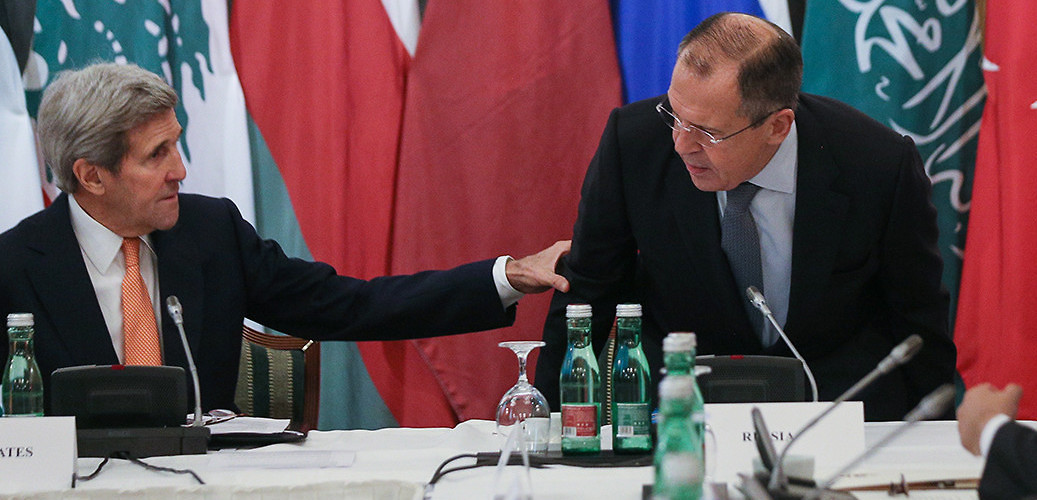US Secretary of State John Kerry and Russian Foreign Minister Sergei Lavrov attend this week's multilateral talks on the Syrian crisis. Vienna, Austria, October 30, 2015. (Alexander Shcherbak/Itar-tass Photo/Corbis)
Iran will today join multilateral talks in Vienna aimed at ending the Syrian crisis—the first time it has been invited to take part. Tehran’s inclusion comes shortly after former United States President Jimmy Carter advocated a five-nation mediated solution to the crisis, including the US, Turkey, Saudi Arabia, Russia, as well as Iran.
The proposal relied on Carter’s own experience dealing with Syrian President Bashar al-Assad and Russian President Vladimir Putin, and Carter Center findings on the unlikely nature of any party to the conflict prevailing militarily. It also called for a more gradual easing of Assad from power than has currently been demanded by the US and other parties.
Speaking with the Global Observatory Assistant Editor James Bowen, the Carter Center’s Director of Conflict Resolution Hrair Balian discussed the opportunities and challenges of implementing the plan, and how it might respond to the longer-term needs of Syria.
Why do you think international approaches to ending the Syrian conflict are failing, and what would the five-nation proposal do differently?
The current proposals are failing because there is disagreement among the five countries that are supporting the various sides in Syria. There is a UN-developed plan, which is called the Geneva Communiqué, from 2012, but unfortunately there are different interpretations on that plan from the various countries and they’ve disagreed as to how they wanted to proceed.
How would the Carter Center proposal overcome that problem?
What we’re suggesting is that these five countries sponsoring the various sides in Syria should agree on a minimal consensus as to what it is that they want out of Syria, taking into account the aspirations of the opposition. And also, as importantly, the fears of the regime and its supporters.
Do you believe there’s widespread support for this proposal in the international community, or among the people that matter?
For the past two months we’ve seen some dim lights on the horizon for a political solution. Several of these countries—the US, Saudi Arabia, Iran, Russia—have been having discussions in various capitals on trying to find a solution to the conflict. These were mainly concerned by the fact that the Assad regime was under enormous pressure from all sides: from external sources, the international community including his own supporters, and also the communities in Syria supporting the regime.
The Russian escalation that started at the beginning of the month put those discussions aside for a while, but now they’ve been taken up again in earnest by the US, Russia, Saudi Arabia, and to a certain extent Turkey. With one additional change, that Iran is now included in the discussion, which should have been so from the outset.
Other parties to the talks taking place in Vienna remain opposed to Iran’s intention of keeping Bashar al-Assad in power. Can anything new be achieved while that opposition remains?
We’ve also heard discussions from Russia that perhaps Assad could stay in power for a transitional period, but not beyond. Of course, it’s a question as to what is a transitional period, how long, and what kind of powers the president would have during that transitional period. And those are details that need to be worked out now. We’re not saying that all the problems have been resolved and taken care of, but dialogue on these very, very critical issues is a beginning where the details can be worked out.
Do you have a vision of how peace and stability might be maintained if Assad did remain?
I’m talking about Assad staying in office only during the transitional period and at the same time transferring most of his executive powers to a cabinet, perhaps in which power would be shared by the current regime and the opposition. Those are some of the conditions under which the transition would take place. And again, I insist that the fears and concerns of the regime and its supporters have to be taken into account, as well as the aspirations of the opposition.
What about the ongoing threat of jihadist groups, especially the so-called Islamic State (ISIS) within Syria, and its possible spread to other areas if defeated there? How would that be managed?
The Islamic State is a gangrene that has taken root in Syria because the state has collapsed in large parts. Syria is not the first place where such groups have taken root. Afghanistan is another example, Somalia was another, Yemen was another, or continues to be another. So it’s not a surprise that something like ISIS has grown in Syria.
But yes, that has to be confronted at some point and defeated. However, the way in which we’re doing it now is not going to go far. Air bombardments alone cannot defeat and get rid of something like ISIS. You need a combined effort of all the communities in Syria, not just the regime and its supporters, but all the communities, in particular the Sunnis in Syria, in order to have an effective impact on ISIS and other groups that are likely to come up.





